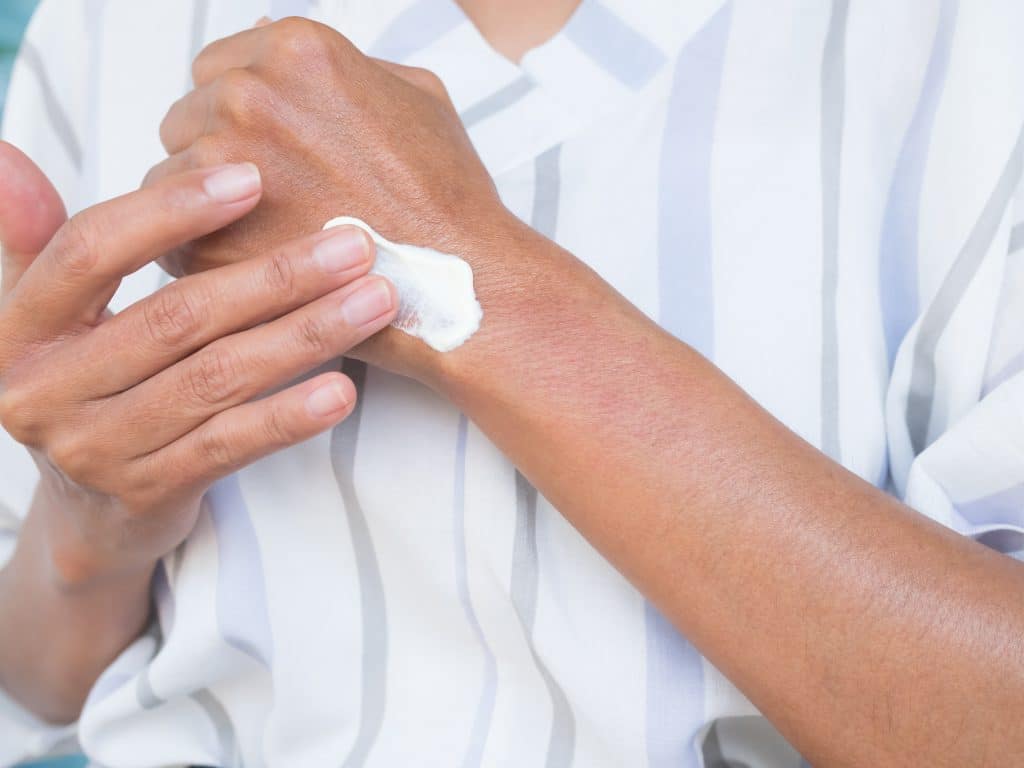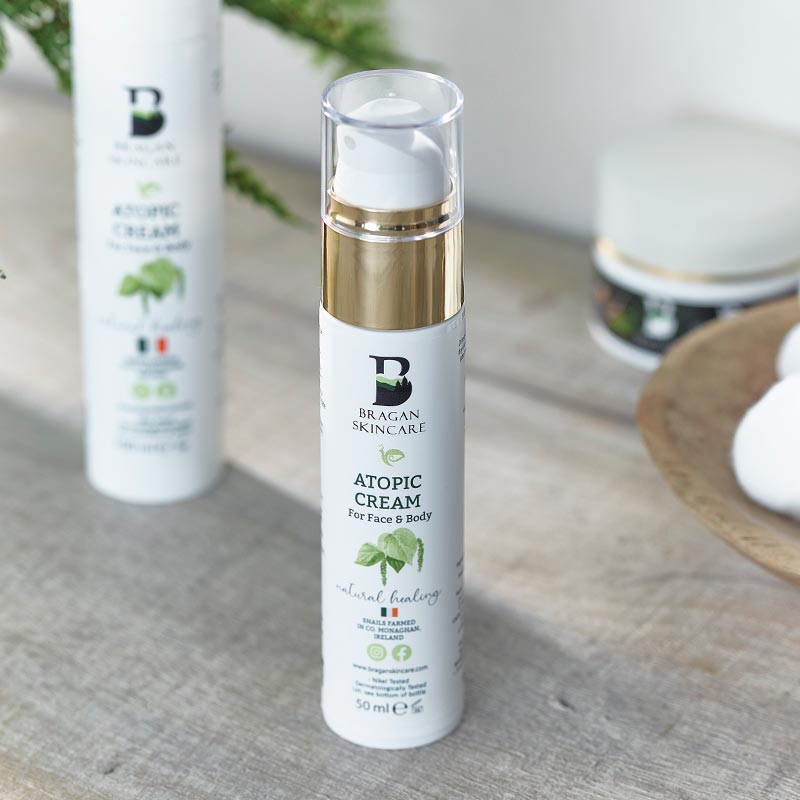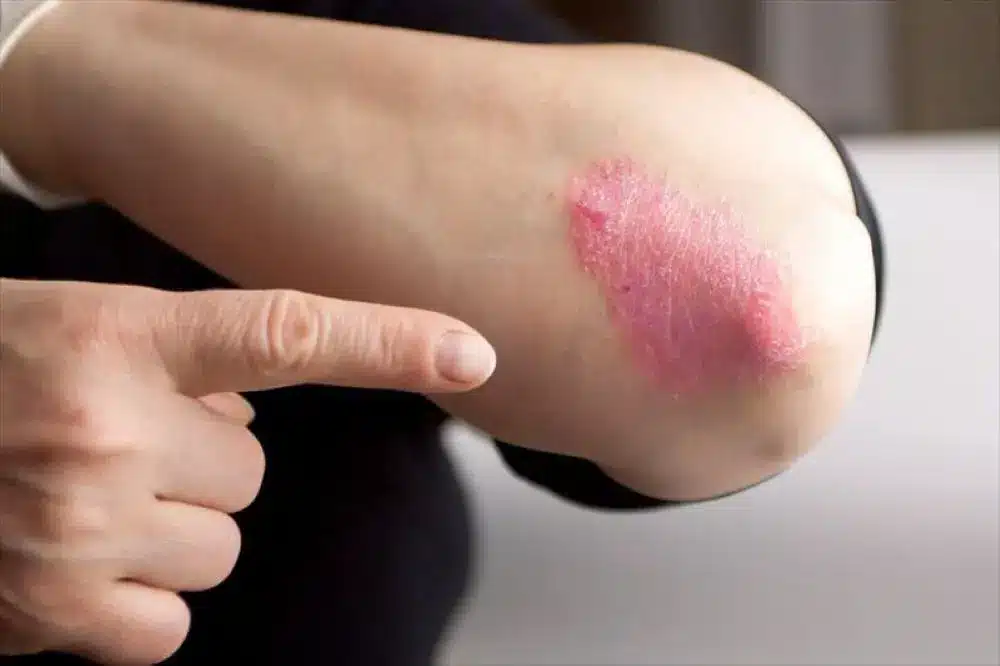Effective Eczema Cream: What Really Works to Soothe and Calm Skin
Eczema can leave skin dry, sore, and intensely itchy. The right cream won’t “cure” eczema, but it can help calm irritation, reduce dryness, and support the skin barrier. In this guide, you’ll learn what to look for in an effective eczema cream, which ingredients help most, and how to apply it for the best results.
For a full overview of eczema causes, triggers, and long-term care, see our Eczema Hub.

Understanding eczema: causes, symptoms, and types
Eczema is a common, long-term skin condition that causes dry, itchy, and inflamed skin. It develops when the skin barrier is weakened, allowing moisture to escape and irritants to penetrate more easily. This can lead to cycles of dryness, itching, and flare-ups that vary in severity from person to person.
The exact cause of eczema is not fully understood. However, it is often linked to a combination of genetic factors and environmental triggers. People with a family history of eczema, asthma, or allergies are more likely to experience it. Common triggers include soaps, fragrances, allergens, stress, weather changes, and certain fabrics.
Eczema can appear in different forms, such as atopic eczema, contact dermatitis, seborrheic dermatitis, or dyshidrotic eczema. While symptoms and triggers can differ, many types share similar features — dryness, itching, redness, and sensitivity. Because of this, gentle skincare and barrier support play an important role across most eczema types.
For a full breakdown of eczema types, causes, triggers, and long-term care strategies, visit our Eczema Hub.
The importance of using an effective eczema cream
Using an effective eczema treatment cream for adults and children is essential for managing the symptoms of this frustrating condition. The right cream not only soothes the skin but also addresses the underlying factors that contribute to flare-ups. Eczema creams are designed to hydrate and protect the skin barrier, which is often compromised in individuals with eczema. When the skin barrier is intact, it can better retain moisture and shield itself from irritants and allergens, leading to a significant reduction in symptoms and flare-ups.
Moreover, an effective eczema cream for sensitive skin can provide immediate relief from itching and inflammation, which are the hallmarks of this condition. When itching is alleviated, individuals are less likely to scratch, reducing the risk of skin damage and subsequent infections. A well-formulated cream can also help to calm redness and irritation, providing a more even skin tone and enhancing the overall appearance of the skin. This improvement in both physical symptoms and skin condition can have a profound impact on self-esteem and quality of life for those living with eczema.
In addition to topical treatments such as Bragan Skincare’s Atopic Cream, using an effective fragrance-free eczema cream for sensitive skin should be part of a comprehensive skincare routine. This routine may include gentle cleansing, regular moisturising, and the avoidance of known triggers. By incorporating an eczema cream into a daily regimen, individuals can create a protective layer over their skin, effectively managing symptoms and preventing future outbreaks. Another key to controlling the condition is to avoid fragrances as they are the enemy of sensitive skin. This multi-faceted approach is vital for achieving long-term relief and maintaining healthy skin.
Key ingredients to look for in an eczema cream
When selecting an eczema cream, it’s crucial to pay attention to the ingredients. Certain components can enhance the cream’s effectiveness in soothing and healing the skin. One of the most beneficial ingredients is snail mucin, which helps restore the skin barrier and lock in moisture. Ceramides are natural lipids found in the skin that diminish when eczema is present, making their inclusion in a cream essential for hydration and protection.
This natural remedy has been used for centuries to relieve itching and irritation. Snail mucin is widely used in modern skincare for its hydrating and soothing properties. Many people with sensitive, eczema-prone skin prefer gentle formulas that focus on barrier support. It can also help reduce the feeling of tightness and support the skin’s moisture barrier.
Other beneficial ingredients include hyaluronic acid, which draws moisture into the skin, and glycerin, a humectant that helps retain hydration, both of these are naturally occurring in snail mucin. For those with particularly inflamed skin, creams containing soothing agents like snail mucin can provide additional relief. It’s also important to look for fragrance-free and hypoallergenic formulas, as these reduce the risk of irritation and allergic reactions. By choosing creams with these key ingredients, individuals can significantly improve their eczema management and overall skin health. Bragan Skincare’s Atopic Cream is fragrance-free and barrier-supportive. Many customers with eczema-prone skin report calmer, less itchy skin with consistent use.
Want a step-by-step daily routine (and how to avoid common triggers)? Visit our Eczema Hub.
Choosing the right eczema cream for your skin type
Selecting the appropriate eczema cream is a vital step in managing this condition effectively. Different skin types may respond better to certain formulations. For example, individuals with oily skin might benefit from lighter lotions that hydrate without adding excess oil, while those with dry skin may require thicker creams or ointments that provide intense moisture and protection. Understanding your skin’s unique needs is essential for achieving optimal results.
When browsing for eczema creams, it’s important to consider specific formulations designed for sensitive skin. Look for products labeled as “suitable for sensitive skin,” as these are less likely to contain irritating ingredients. Additionally, creams that are free from parabens, sulfates, and synthetic fragrances are generally safer for those with eczema-prone skin. These formulations can prevent exacerbating the condition while still delivering the necessary hydration and relief.
It may also be helpful to consult with a dermatologist when choosing an eczema cream. They can provide personalised recommendations based on your skin type, severity of eczema, and any additional concerns you may have. This professional guidance can lead to a more tailored approach, ensuring that you select a product that meets your specific needs, ultimately leading to better management of your eczema symptoms.
How to apply to Bragan Skincare’s Atopic Cream

Quick routine for using eczema cream
- Apply after washing: while skin is slightly damp
- Use twice daily: morning and night
- Reapply to dry patches: especially hands, elbows, and ankles
- Avoid fragrance: including scented washes and “essential oils”
Applying eczema cream correctly is just as important as choosing the right product. To maximise the cream’s effectiveness, start by gently cleansing the affected area with a mild, fragrance-free cleanser. Pat the skin dry with a soft towel, avoiding any vigorous rubbing that might irritate the skin further. It’s best to apply the cream immediately after bathing while the skin is still slightly damp, as this helps to lock in moisture.
When applying the cream, use a small amount and massage it into the skin using gentle circular motions. Be sure to cover all affected areas, including any dry patches or areas prone to flare-ups. Allow the cream to absorb completely before dressing or applying additional products.
For best results, it’s advisable to apply the eczema cream at least twice a day. Consistency is key in managing eczema, so integrating this step into your daily skincare routine can lead to significant improvements. Additionally, consider using a humidifier in your living space, especially during dry months, to complement the hydrating effects of your eczema cream and promote overall skin health.
Lifestyle changes to support the effectiveness of your eczema cream
In addition to using the right eczema cream, making lifestyle changes can significantly enhance its effectiveness. First and foremost, maintaining a consistent skincare routine is crucial. This includes not only the application of eczema cream but also regular moisturising throughout the day. Opting for a thick, fragrance-free moisturiser can help create a protective barrier on the skin, minimising moisture loss and reducing the likelihood of flare-ups.
Diet can also play a vital role in managing eczema symptoms. Some individuals find that certain foods trigger their eczema, such as dairy, gluten, or nuts. Keeping a food diary may help identify potential triggers, allowing for informed dietary choices. Incorporating anti-inflammatory foods, such as fatty fish rich in omega-3 fatty acids, fruits, and vegetables, can also support skin health and reduce inflammation. Staying hydrated by drinking plenty of water is equally important, as proper hydration helps maintain skin elasticity and overall health.
Lastly, stress management is a crucial aspect of living with eczema. Stress can trigger or worsen flare-ups, making it essential to incorporate relaxation techniques into your daily routine. Practices such as yoga, meditation, or deep breathing exercises can help alleviate stress levels and promote a sense of calm. By adopting these lifestyle changes, individuals can create a supportive environment for their eczema cream, leading to more effective symptom management and improved overall quality of life.
Common mistakes to avoid
While using an eczema cream can significantly improve skin condition, there are common mistakes that can hinder its effectiveness. One frequent error is applying the cream inconsistently or neglecting it altogether during periods of improvement. It’s essential to maintain a regular application schedule, even when the skin appears to be clear. This proactive approach can help prevent future flare-ups and keep the skin barrier healthy.
- Using hot water
- Over-washing
- Switching products too often
- Using fragranced “natural” products
- Scratching without protecting the skin (trim nails, cotton gloves at night)
Natural remedies and alternative treatments for eczema
Snail Mucin has been a tried and tested natural remedy for eczema for centuries. Recently it has found fame for it’s naturally hydrating qualities particularly in Korean cosmetic skincare. Bragan Skincare uses snail mucin in its products to support hydration and barrier care for sensitive, eczema-prone skin.
Frequently Asked Questions About Eczema Cream
Q: What is the best cream for eczema?
A: The best eczema cream is one that soothes itching, repairs the skin barrier, and locks in moisture. Look for fragrance-free formulas with ingredients like snail mucin, ceramides, hyaluronic acid, and glycerin. Bragan Skincare’s Atopic Cream contains these key elements to help calm and protect sensitive skin.
Q: Can snail mucin help eczema?
A: Yes. Snail mucin is rich in natural compounds that restore hydration, reduce redness, and support skin repair. It also helps strengthen the skin barrier, making it especially useful for people with eczema-prone skin.
Q: Is eczema cream safe for children?
A: Many fragrance-free and hypoallergenic eczema creams are safe for children, but it’s always best to check with a doctor first. Bragan Skincare’s Atopic Cream is designed with sensitive skin in mind and has been used successfully by families on both adults and children.
Q: How often should I apply eczema cream?
A: For best results, apply at least twice daily — once in the morning and once at night. Applying after a bath or shower, while the skin is slightly damp, helps to lock in moisture and maximise relief.
Q: Can diet or lifestyle changes improve eczema alongside cream use?
A: Yes. Eating anti-inflammatory foods, staying hydrated, managing stress, and avoiding triggers such as fragrances can make a big difference. Combining these habits with regular use of an effective eczema cream provides the best chance of long-term relief.
Conclusion: Achieving relief and managing eczema with the right cream
In conclusion, managing eczema effectively requires a multi-faceted approach that includes the right eczema cream, proper application techniques, and lifestyle changes. By understanding the causes and types of eczema, individuals can make informed choices about their skincare products. Selecting creams that contain beneficial ingredients and adapting their application routine can lead to significant improvements in skin health.
Moreover, lifestyle modifications such as dietary adjustments, stress management, and consistent moisturising can further enhance the effectiveness of eczema creams. Being mindful of common mistakes and exploring natural remedies can provide additional avenues for relief. With the right tools and knowledge, individuals can take control of their eczema, achieving healthier and happier skin.
Ultimately, it’s important to remember that everyone’s skin is unique, and what works for one person may not work for another. Consulting with a dermatologist can provide personalised guidance and support in finding the most effective treatment plan. By unlocking the secrets to effective eczema cream, individuals can pave the way towards a more comfortable and fulfilling life, free from the limitations of this challenging condition.
If you want a full overview of eczema — including causes, symptoms, triggers, and the best daily routine — visit our Eczema Hub.
Atopic Cream for Eczema, Psoriasis & Dermatitis | Fragrance-Free Barrier Care
Living with eczema, psoriasis, or dermatitis means your skin needs calm, consistent support — not harsh treatments.
Bragan Skincare’s Atopic Cream is a fragrance-free, steroid-free barrier cream designed to soothe dry, itchy, irritation-prone skin while supporting long-term skin comfort.
How to use:
Apply a thin layer to clean, dry skin once or twice daily. Massage gently until absorbed. Use consistently for best results.
Allergy notice:
Contains snail mucin. If you have a shellfish allergy, avoid use and patch test before wider application.
Stock up & save:
Choose a larger size or add multiple items to your basket for better value.
Fragrance-free • Steroid-free • Suitable for face & body
About the Author
Kieran Corley is the founder of Bragan Skincare, based in Co. Monaghan, Ireland. With years of experience developing skincare solutions using natural ingredients like snail mucin, Kieran has helped countless people manage skin concerns such as eczema, psoriasis, and sensitive skin. His passion for creating gentle yet effective treatments is rooted in both science and tradition, making Bragan Skincare a trusted name for those seeking natural relief.

Featured Bragan Skincare Products
-
€32.51 – €81.30Price range: €32.51 through €81.30Select options This product has multiple variants. The options may be chosen on the product page
-
€81.30Select options This product has multiple variants. The options may be chosen on the product page

